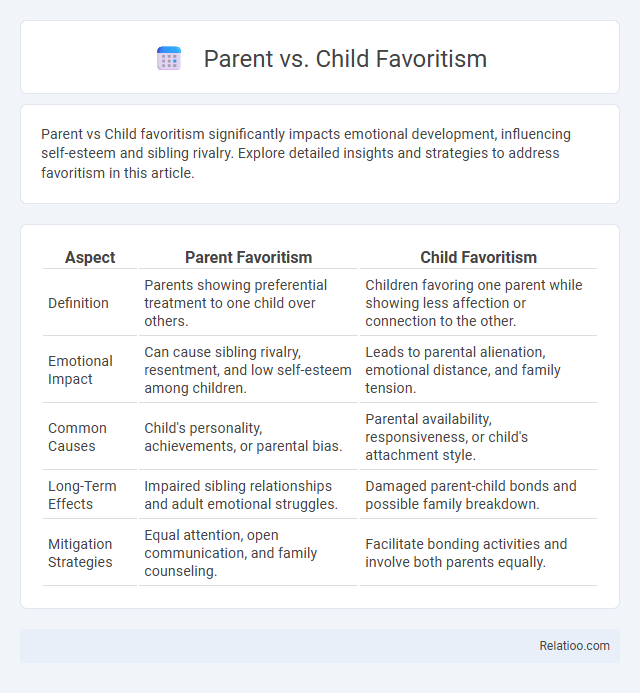Parent vs Child favoritism significantly impacts emotional development, influencing self-esteem and sibling rivalry. Explore detailed insights and strategies to address favoritism in this article.
Table of Comparison
| Aspect | Parent Favoritism | Child Favoritism |
|---|---|---|
| Definition | Parents showing preferential treatment to one child over others. | Children favoring one parent while showing less affection or connection to the other. |
| Emotional Impact | Can cause sibling rivalry, resentment, and low self-esteem among children. | Leads to parental alienation, emotional distance, and family tension. |
| Common Causes | Child's personality, achievements, or parental bias. | Parental availability, responsiveness, or child's attachment style. |
| Long-Term Effects | Impaired sibling relationships and adult emotional struggles. | Damaged parent-child bonds and possible family breakdown. |
| Mitigation Strategies | Equal attention, open communication, and family counseling. | Facilitate bonding activities and involve both parents equally. |
Understanding Parent vs Child Favoritism
Parent vs child favoritism involves the complex dynamics where parents show preferential treatment toward specific children, impacting familial relationships and emotional well-being. Understanding parent vs child favoritism requires analyzing behavioral patterns, psychological effects, and the long-term influence on sibling rivalry and self-esteem. Recognizing favoritism in families helps in addressing imbalances and fostering healthier parent-child connections.
Signs of Favoritism in Families
Signs of favoritism in families often include unequal attention, biased praise, and inconsistent rules that clearly benefit one child over others. Favoritism may manifest through parents giving more privileges, emotional support, or resources to a preferred child, causing feelings of resentment and rivalry among siblings. Recognizing these patterns helps you address the emotional impact and promote fairness and harmony within the family dynamic.
Psychological Impact on Favored Children
Favored children often experience increased self-esteem and a sense of entitlement, which can lead to difficulties in developing empathy and healthy relationships. Psychological impact includes heightened pressure to meet parental expectations and anxiety linked to maintaining favoritism, potentially resulting in long-term emotional distress. Understanding the nuanced effects of favoritism by parents versus children provides insight into family dynamics and emotional development.
Effects on Non-Favored Siblings
Non-favored siblings in families exhibiting parent or child favoritism often experience increased feelings of neglect, lower self-esteem, and heightened anxiety. Research indicates these siblings may develop behavioral problems, academic struggles, and difficulty forming healthy relationships due to chronic emotional stress. Long-term psychological impacts include persistent resentment and reduced overall family cohesion, highlighting the critical need for equitable parenting practices.
Root Causes of Family Favoritism
Family favoritism often stems from unconscious biases rooted in parents' emotional needs and unresolved past experiences, influencing differential treatment of children. Factors such as birth order, temperament compatibility, and parental stress levels contribute to favoritism by shaping perceived child value and parental expectations. Understanding these root causes is essential to addressing the deep-seated dynamics that perpetuate preferential behaviors within family systems.
Long-Term Consequences for Parent-Child Relationships
Favoritism in parent-child relationships can lead to long-term consequences such as sibling rivalry, decreased self-esteem, and emotional distance between family members. Child favoritism often results in feelings of neglect and resentment in the non-favored child, which may damage trust and communication with the parent over time. You can foster healthier relationships by ensuring fairness and equal attention to all children, promoting emotional security and stronger family bonds.
Cultural Perspectives on Favoritism
Cultural perspectives on favoritism significantly influence how parent vs. child favoritism is perceived and enacted, shaping family dynamics and social expectations. In collectivist societies, favoritism often aligns with maintaining family harmony and fulfilling roles, while individualistic cultures may view it as a breach of fairness and equality. Understanding these cultural frameworks helps you navigate and address favoritism within diverse family contexts more effectively.
Strategies to Prevent Favoritism at Home
Establishing clear family rules and consistent consequences helps prevent favoritism by promoting fairness and respect among all children. Encouraging open communication and actively listening to each child's needs fosters emotional security and reduces feelings of neglect or favoritism. Parents can implement personalized positive reinforcement tailored to each child's strengths to ensure balanced support without bias.
Healing and Rebuilding Family Bonds
Favoritism, whether by parents or children, deeply impacts family dynamics and can cause long-lasting emotional wounds that hinder trust and connection. Healing requires open communication, empathy, and consistent efforts to validate each family member's feelings while addressing underlying issues openly. Rebuilding family bonds involves setting equitable boundaries, fostering mutual respect, and creating shared positive experiences to restore harmony and unity within the family.
When to Seek Professional Help
Persistent patterns of favoritism within family dynamics, such as parent vs child favoritism or favoritism among siblings, can lead to emotional distress, low self-esteem, and long-term relational conflicts. Professional help should be sought when favoritism causes significant communication breakdown, behavioral issues in children, or mental health concerns such as anxiety and depression. Early intervention by family therapists or counselors can facilitate healthier family relationships and address deep-rooted emotional wounds effectively.

Infographic: Parent vs Child Favoritism
 relatioo.com
relatioo.com